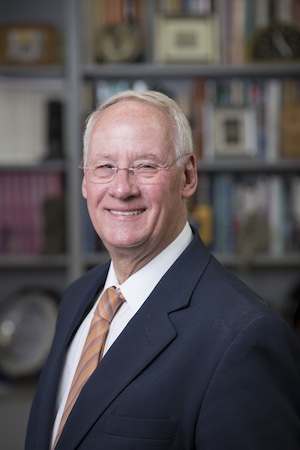By Alexander Junxiang Chen
It was 1966. Bread was a quarter a loaf, and a cup of freshly brewed coffee would set you back only a dime. So, when then-college student Ed Ray received a letter informing him that he had been inducted into the Phi Beta Kappa chapter at Queens College, the initial wave of excitement that washed over him was quickly replaced by one of despair as his eyes came across the fee for induction: $25.
“I was very happy,” reflected Ray, who five decades later, is now President Emeritus at Oregon State University. “But I actually did not have $25. So, I told my parents about this. My dad was at work that night, and my mother said she didn’t have $25. That night a friend of my mother came over, and I told her that I got this letter. She had an associate’s degree and had heard of Phi Beta Kappa. She was very excited about the good news. I told her, ‘Yeah, they’re gonna have this reception. But I’m not going.”
The friend was shocked. As Ray reminisced, “she asked me why I wasn’t going, so I said, ‘Well, they’re gonna have some kind of induction ceremony where you get this gold key and get inducted, but I don’t have $25, and if I go, I’m going to be humiliated, because I won’t feel like I belong.’ Hearing this, she handed me $25 and said, ‘You need to go because you earned this.’ And that’s how I ended up being inducted into Phi Beta Kappa.”
More than five decades and one illustrious career later, Ray still keeps this memory of this first encounter with Phi Beta Kappa near and dear to his heart. Indeed, nothing has illustrated his commitment to the Society better than the vital role that he played in supporting the establishment of a ΦBK chapter at Oregon State, not long after he was inaugurated its 14th president in 2003 following an already incredible three-decade stint as economics department chair and provost at Ohio State University.
“When I came to Oregon State and learned that it didn’t have a ΦBK chapter like Ohio State, I decided, well that’s nuts! We have to become a part of Phi Beta Kappa,” Ray recalled. Faced with the challenge of not only gathering support for a chapter itself but also funding for students (like himself a half-century earlier) with limited financial resources, Ray looked to the wider Oregon State community for help.
“Several people stepped up and took the lead in developing the formal proposal for a recognized chapter, and what I told them is, I would give money to begin an endowment fund for a Phi Beta Kappa chapter, which would provide money for any student who was accepted and could not afford the initiation fee,” remembered Ray. “I named [the fund] for the woman, Kay Bowers, who had given me the $25 so I could become a member. I didn’t want any OSU student to go through the experience I went through.”
The establishment of the endowment fund by Ray was key in helping fast-track the chapter proposal and approval process at Oregon State, and by 2015, a new OSU chapter was able to celebrate its first cohort of inductees.
Though he retired as OSU President in 2020, Ray remains an active professor of economics and public policy, and he continues to dedicate much of his time to mentoring students and young professionals. “To me, being the first in my family to attend college was like being let loose in a candy store, where there were all kinds of goodies in every direction I could sample,” he recollected. “And being able to receive an incredibly diverse liberal arts education myself, I always tell students to explore areas of study that appeal to their inclinations and interests, because success in life is all about being able to look back later on and say: ‘I’m good with that.”
Ray also continues to strive to learn something new every day. “I cannot remember a time when I was not curious and did not want to understand things and learn things,” he admitted. He offered one humorous example of this persistent curiosity from about a decade ago. “When I was a little kid, my older brother was told to teach me how to tie my shoes, and of course you teach a kid to tie a double knot, and so I learned how to tie a double knot. But he didn’t spend any time on it. He did the minimum.”
“Well, here I am at age 70, working loose the knots every night when I’m taking my shoes off, and what I discovered is if you pull on one end of a lace, you have a 50-50 chance of untying both knots,” Ray described with a chuckle. “So, I shared this discovery with Gene Block, the UCLA Chancellor, who informed me that apparently there have been physics papers written on how exactly shoelaces become untied.”
“I found that so interesting,” Ray said, “and I’m sure the day I turn 80, I’ll still be learning stuff like that. I certainly hope so.”
Alexander Junxiang Chen is a senior at Harvard University who is pursuing a double concentration in neuroscience and chemistry. He was inducted into the Alpha Iota of Massachusetts chapter of Phi Beta Kappa in April 2023.




